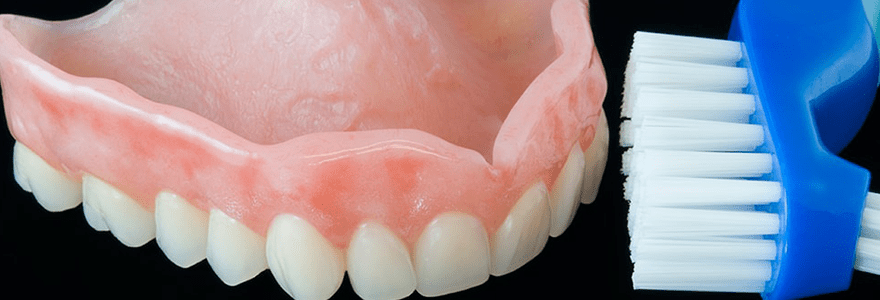Removable partial or full dentures require proper care to keep them clean, free from stains and looking their best. For good denture care:
- Remove and rinse dentures after eating – Run water over your dentures to remove food debris and other loose particles. You may want to place a towel on the counter or in the sink or put some water in the sink so the dentures won’t break if you drop them.
- Handle your dentures carefully – Be sure you don’t bend or damage the plastic or the clasps when cleaning.
- Clean your mouth after removing your dentures – Use a soft-bristled toothbrush on natural teeth and gauze or a soft toothbrush to clean your tongue, cheeks and roof of your mouth (palate).
- Brush your dentures at least daily – Gently clean your dentures daily by soaking and brushing with a nonabrasive denture cleanser to remove food, plaque and other deposits. If you use denture adhesive, clean the grooves that fit against your gums to remove any remaining adhesive. Do not use denture cleansers inside your mouth.
- Soak dentures overnight – Most types of dentures need to remain moist to keep their shape. Place the dentures in water or a mild denture-soaking solution overnight. Check with your dentist about properly storing your dentures overnight. Follow the manufacturer’s instructions on cleaning and soaking solutions.
- Rinse dentures before putting them back in your mouth, especially if using a denture-soaking solution – These solutions can contain harmful chemicals that cause vomiting, pain or burns if swallowed.
- Schedule regular dental checkups – Your dentist will advise you about how often to visit to have your dentures examined and professionally cleaned. Your dentist can help ensure a proper fit to prevent slippage and discomfort. Your dentist can also check the inside of your mouth to make sure it’s healthy.
- Think of them as real teeth – Just as you would brush your natural teeth twice a day, you should brush your dentures twice a day as well.
- Follow directions – Be sure to follow all instructions that your dentist gives you regarding care and cleaning, and do not hesitate to ask questions.
- See your dentist if you have a loose fit – See your dentist promptly if your dentures become loose. Loose dentures can cause irritation, sores and infection.
Here are a few things you typically should avoid:
- Abrasive cleaning materials – Avoid stiff-bristled brushes, strong cleansers and harsh toothpaste, as these are too abrasive and can damage your dentures.
- Whitening toothpastes – Toothpastes advertised as whitening pastes are especially abrasive and generally should be avoided on dentures.
- Bleach-containing products – Do not use any bleaching products because these can weaken dentures and change their color. Don’t soak dentures with metal attachments in solutions that contain chlorine because it can tarnish and corrode the metal.
- Hot water – Avoid hot or boiling water that could warp your dentures.
You can do serious harm to your denture and to your health by trying to adjust or repair your denture. Using a do-it-yourself kit can damage the appliance beyond repair. Glues sold over-the-counter often contain harmful chemicals and should not be used on a denture. If your denture breaks, cracks or chips, or if one of the teeth becomes loose, call your dentist immediately.
At Expressions Dental, our general dentists can answer your questions. Click here to connect to our general dentists to know about dentures and removable dental appliances options.


